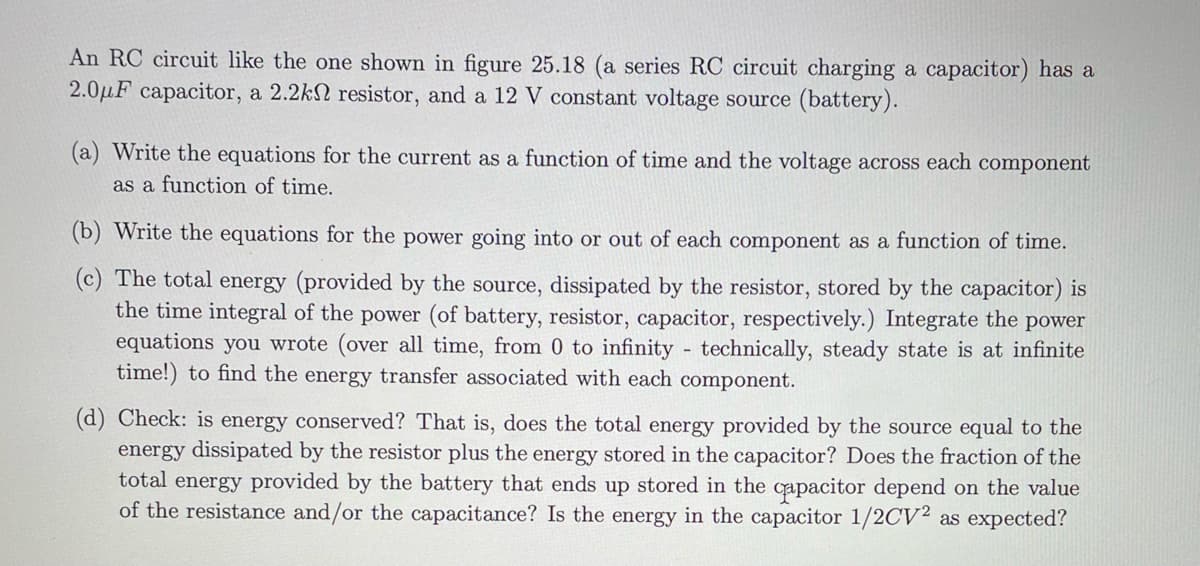An RC circuit like the one shown in figure 25.18 (a series RC circuit charging a capacitor) has a 2.0μF capacitor, a 2.2k resistor, and a 12 V constant voltage source (battery). (a) Write the equations for the current as a function of time and the voltage across each component as a function of time. (b) Write the equations for the power going into or out of each component as a function of time. (c) The total energy (provided by the source, dissipated by the resistor, stored by the capacitor) is the time integral of the power (of battery, resistor, capacitor, respectively.) Integrate the power equations you wrote (over all time, from 0 to infinity - technically, steady state is at infinite time!) to find the energy transfer associated with each component. 1- (d) Check: is energy conserved? That is, does the total energy provided by the source equal to the energy dissipated by the resistor plus the energy stored in the capacitor? Does the fraction of the total energy provided by the battery that ends up stored in the capacitor depend on the value of the resistance and/or the capacitance? Is the energy in the capacitor 1/2CV2 as expected?
An RC circuit like the one shown in figure 25.18 (a series RC circuit charging a capacitor) has a 2.0μF capacitor, a 2.2k resistor, and a 12 V constant voltage source (battery). (a) Write the equations for the current as a function of time and the voltage across each component as a function of time. (b) Write the equations for the power going into or out of each component as a function of time. (c) The total energy (provided by the source, dissipated by the resistor, stored by the capacitor) is the time integral of the power (of battery, resistor, capacitor, respectively.) Integrate the power equations you wrote (over all time, from 0 to infinity - technically, steady state is at infinite time!) to find the energy transfer associated with each component. 1- (d) Check: is energy conserved? That is, does the total energy provided by the source equal to the energy dissipated by the resistor plus the energy stored in the capacitor? Does the fraction of the total energy provided by the battery that ends up stored in the capacitor depend on the value of the resistance and/or the capacitance? Is the energy in the capacitor 1/2CV2 as expected?
Physics for Scientists and Engineers: Foundations and Connections
1st Edition
ISBN:9781133939146
Author:Katz, Debora M.
Publisher:Katz, Debora M.
Chapter29: Direct Current (dc) Circuits
Section: Chapter Questions
Problem 76PQ
Related questions
Question
b c d

Transcribed Image Text:An RC circuit like the one shown in figure 25.18 (a series RC circuit charging a capacitor) has a
2.0μF capacitor, a 2.2k resistor, and a 12 V constant voltage source (battery).
(a) Write the equations for the current as a function of time and the voltage across each component
as a function of time.
(b) Write the equations for the power going into or out of each component as a function of time.
(c) The total energy (provided by the source, dissipated by the resistor, stored by the capacitor) is
the time integral of the power (of battery, resistor, capacitor, respectively.) Integrate the power
equations you wrote (over all time, from 0 to infinity - technically, steady state is at infinite
time!) to find the energy transfer associated with each component.
(d) Check: is energy conserved? That is, does the total energy provided by the source equal to the
energy dissipated by the resistor plus the energy stored in the capacitor? Does the fraction of the
total energy provided by the battery that ends up stored in the capacitor depend on the value
of the resistance and/or the capacitance? Is the energy in the capacitor 1/2CV2 as expected?
Expert Solution
This question has been solved!
Explore an expertly crafted, step-by-step solution for a thorough understanding of key concepts.
Step by step
Solved in 7 steps with 1 images

Knowledge Booster
Learn more about
Need a deep-dive on the concept behind this application? Look no further. Learn more about this topic, physics and related others by exploring similar questions and additional content below.Recommended textbooks for you

Physics for Scientists and Engineers: Foundations…
Physics
ISBN:
9781133939146
Author:
Katz, Debora M.
Publisher:
Cengage Learning

Principles of Physics: A Calculus-Based Text
Physics
ISBN:
9781133104261
Author:
Raymond A. Serway, John W. Jewett
Publisher:
Cengage Learning

College Physics
Physics
ISBN:
9781285737027
Author:
Raymond A. Serway, Chris Vuille
Publisher:
Cengage Learning

Physics for Scientists and Engineers: Foundations…
Physics
ISBN:
9781133939146
Author:
Katz, Debora M.
Publisher:
Cengage Learning

Principles of Physics: A Calculus-Based Text
Physics
ISBN:
9781133104261
Author:
Raymond A. Serway, John W. Jewett
Publisher:
Cengage Learning

College Physics
Physics
ISBN:
9781285737027
Author:
Raymond A. Serway, Chris Vuille
Publisher:
Cengage Learning

College Physics
Physics
ISBN:
9781305952300
Author:
Raymond A. Serway, Chris Vuille
Publisher:
Cengage Learning

Physics for Scientists and Engineers, Technology …
Physics
ISBN:
9781305116399
Author:
Raymond A. Serway, John W. Jewett
Publisher:
Cengage Learning
